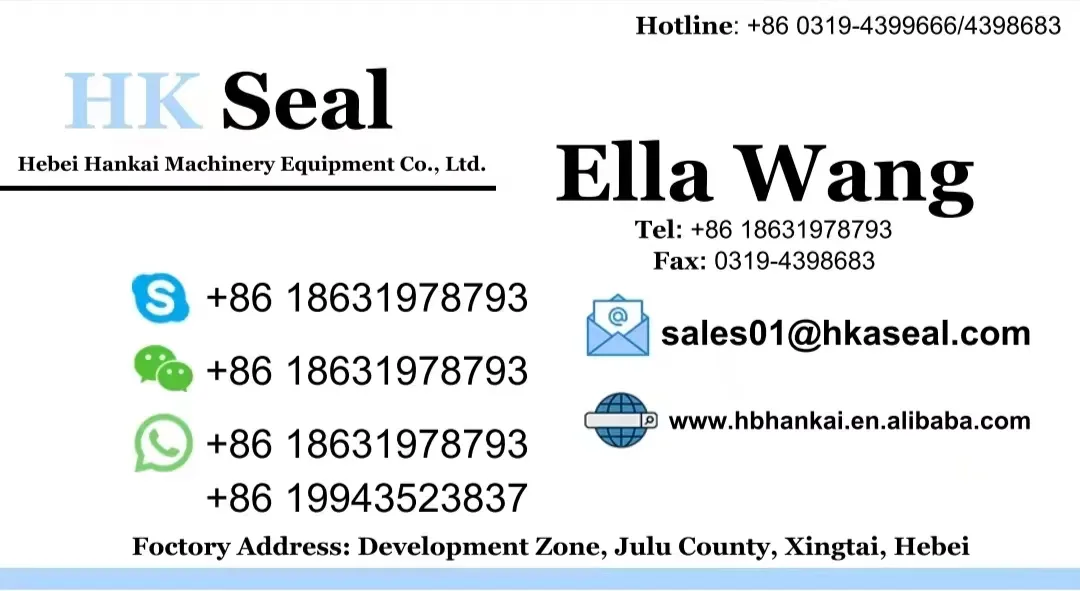Dec . 11, 2024 03:33 Back to list
High-Performance Hub and Axle Oil Seals for Reliable Automotive Solutions
Understanding Hub Oil Seals and Axle Seals Maintenance and Importance
In the world of automotive engineering, oil seals play a crucial role in maintaining the integrity and functionality of various components of a vehicle. Two of the most vital seals are hub oil seals and axle seals. These components are essential for ensuring that vehicles operate smoothly and efficiently. This article delves into the functions, importance, and maintenance of hub oil seals and axle seals.
What are Hub Oil Seals?
Hub oil seals are specialized components designed to prevent the leakage of lubricants from the hub assembly of a vehicle's axle. They serve as barriers that keep grease or oil in while preventing contaminants like dirt, dust, and moisture from entering the hub. The hub assembly includes parts such as the wheel bearings, which require proper lubrication to function effectively.
The hub oil seal is typically made from durable materials such as rubber or synthetic compounds, which can withstand various environmental factors and mechanical stresses. Given their location and function, these seals are crucial for preventing friction and wear on the bearings.
What are Axle Seals?
Axle seals, on the other hand, are used to seal the area where the axle shaft enters the differential or the transmission. Their primary role is to retain the lubricant within these components, ensuring that the moving parts have adequate lubrication to prevent overheating and wear. Similar to hub oil seals, axle seals are also constructed from high-quality materials designed to endure extreme temperatures and pressures.
The Importance of Hub and Axle Seals
Both hub oil seals and axle seals have significant implications for vehicle performance and longevity. A failed seal can lead to lubricant leakage, which might result in insufficient lubrication for bearings or gears. This deficiency can cause increased friction, overheating, and ultimately, component failure.
For instance, if a hub oil seal fails, it can lead to bearing degradation, which may produce loud noises while driving and may require costly repairs or replacements. Similarly, if an axle seal fails, it can allow axle lubricant to leak, potentially causing damage to the differential or transmission.
hub oil seals axle seals

Besides functional issues, a leak from either seal can also lead to environmental concerns, as leaked fluids can contaminate the surrounding soil and water, leading to further regulatory and ecological impacts.
Maintenance of Hub Oil Seals and Axle Seals
Regular maintenance is essential for preventing seal failures. Here are some simple steps vehicle owners can take to ensure the longevity and reliability of their hub oil seals and axle seals
1. Regular Inspections Schedule periodic checks of your vehicle's seals. Look for signs of oil leakage around the wheel hubs and axle areas. Early detection can save significant costs in repairs.
2. Fluid Changes Adhere to the manufacturer's recommendations for changing axle and hub lubricants. Using the correct type of lubricant is crucial for the proper functioning of the seals.
3. Wheel Alignment and Balancing Maintaining proper alignment and balance reduces undue stress on seals and bearings, contributing to their longevity.
4. Professional Assistance If you notice any symptoms of seal failure, such as abnormal noises or fluid spots on the ground, consult with a qualified mechanic as soon as possible.
5. Replacement If a seal is found to be defective, replace it immediately. It's typically a straightforward process, but it can save much larger issues down the road.
Conclusion
In summary, hub oil seals and axle seals are vital to the safe and efficient operation of vehicles. Proper maintenance and timely replacements can help avoid major issues and extend the life of the vehicle's components. Vehicle owners should prioritize understanding these small but significant seals, as their performance directly affects the vehicle's overall health and environmental impact. By being proactive about seal maintenance, you ensure your vehicle remains in optimal condition, ultimately saving time and resources in the long run.
-
TCN Oil Seal Metal Ring Reinforcement for Heavy Machinery
NewsJul.25,2025
-
Rotary Lip Seal Spring-Loaded Design for High-Speed Applications
NewsJul.25,2025
-
Hydraulic Cylinder Seals Polyurethane Material for High-Impact Jobs
NewsJul.25,2025
-
High Pressure Oil Seal Polyurethane Coating Wear Resistance
NewsJul.25,2025
-
Dust Proof Seal Double Lip Design for Construction Equipment
NewsJul.25,2025
-
Hub Seal Polyurethane Wear Resistance in Agricultural Vehicles
NewsJul.25,2025
-
The Trans-formative Journey of Wheel Hub Oil Seals
NewsJun.06,2025
Products categories
















